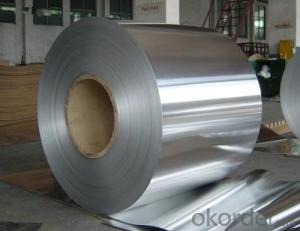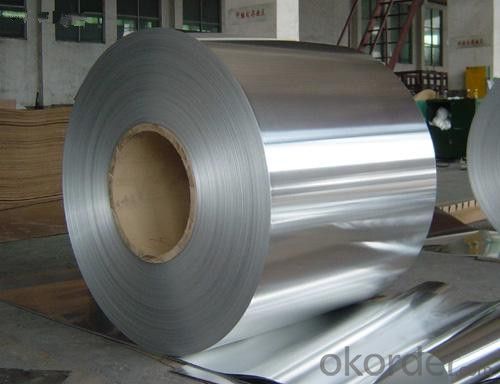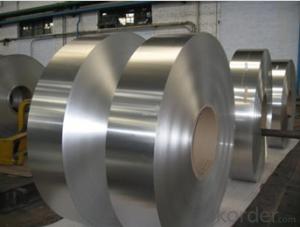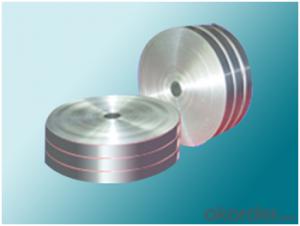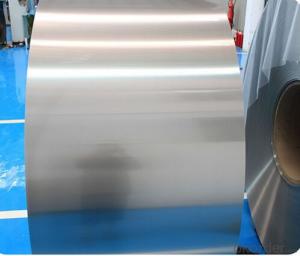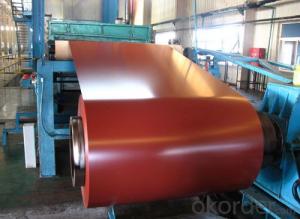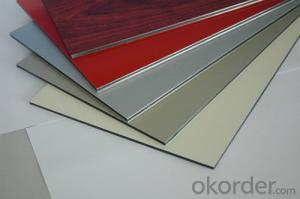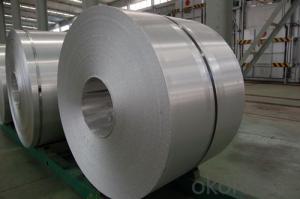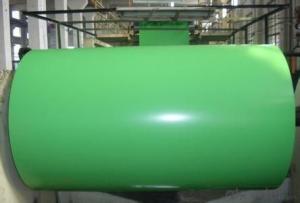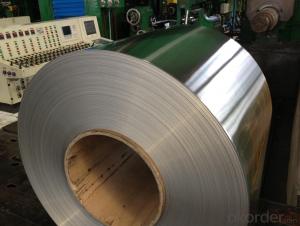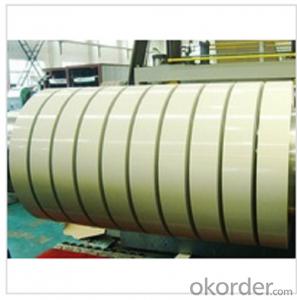Coated Aluminum Coil Sheet for Aluminium Composite Panel
- Loading Port:
- Shanghai
- Payment Terms:
- TT OR LC
- Min Order Qty:
- 5 m.t.
- Supply Capability:
- 60000 m.t./month
OKorder Service Pledge
OKorder Financial Service
You Might Also Like
Specification
Coated Aluminium Tape for Aluminium Composite Panel
Description
Alloy | 1060, 1100, 3003, 8011, etc. |
Temper | H16, H18, H24, H26, H28 |
Thickness | From 0.05mm to 3.0mm |
Width | Standard width:1240mm |
Special width:1300mm, 1520mm, 1570mm, 1595mm | |
Diameter | Standard dia:1200mm |
Interior dia:150mm,405mm,505mm | |
Weight | 2.5 T/coil,3.0 T/coil |
Coating | PE, PVDF, ACRYLIC |
Surface | Embossed, mill finish, coated |
Color | AS to code RAL |
Gloss | 10-90%(EN ISO-2813:1994) |
Coating Thickness | PE: more than 18 micron |
PVDF: more than 25 micron | |
Coating Hardness(pencil resistance) | More than 2h |
Coating adhesion | 5J (EN ISO-2409:1994) |
Impact Resistance | No peeling or cracking(50 kg/cm,ASTMD-2794:1993) |
Flexibility(T-bend) | 2T |
MEK resistance | More than 100 |
Advantage | 1.High temperature resistant 2.Weathering resistant 3.Scrubbing resistant 5.Acid or alkali proof 6. Fireproof 7.Light weight material is easy to construct and install |
Out package | Wooden splint with export standard |
Application | ACP, wall cladding, facades, roofs and canopies, ceilings, signboards, blind window, display platforms, electrical panels, etc |
Manufacturing
Decoiler → Accumulator →Tension Leveler →Acid & Alkali Cleaner → Rinse →Conversion Treatment → Priming coater →Infrared Curing Oven →Main coater →Floatation Curing Oven →Strippable Film Applicator → Exit Accumulator → Recoiler
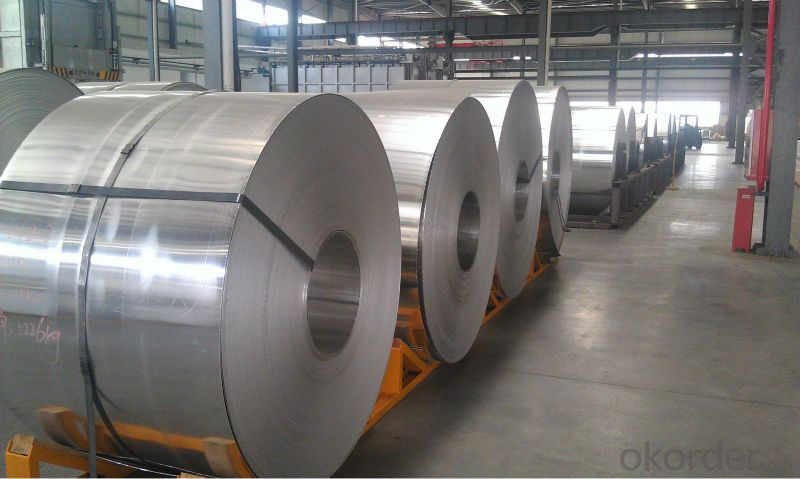
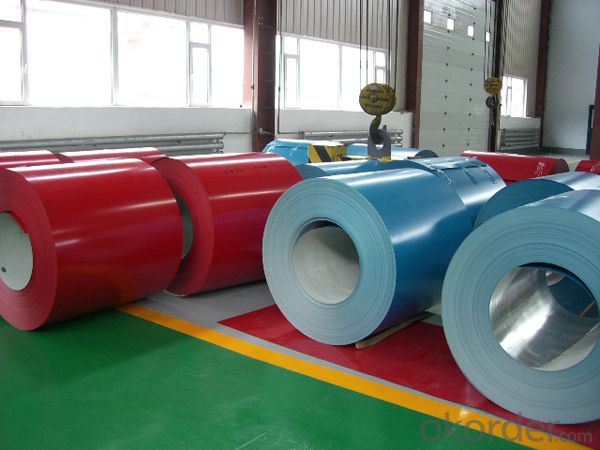
Polyester Coatings (PE)
PE (polyester) coatings exhibit an excellent combination of hardness, flexibility, flow, appearance, and superior resistance to dirt retention in indoor and outdoor applications. These coatings are highly resistant to abrasion, metal marking, staining, and marring, and require minimal maintenance. Glazetech uses polyester paints which provide excellent colour and gloss retention properties.
Polyvinylidene Fluoride Coatings (PVDF)
PVDF (polyvinylidene fluoride) is a chemical resistant thick film barrier coating commonly used in architectural applications where both excellent appearance and substrate protection must be maintained over a long period of time. This coating is unaffected by most chemicals and solvents and has excellent wear and abrasion resistance. PVDF also has a high dielectric strength, excellent resistance to weathering and the ability to self extinguish.
Application
Widely used in manufacturing of products as well as other industrial applications like:
Products Materials: PP cap stock, the traffic sign, air-conditioner heat and exchangers, food container, household foil, pharmaceutical packing, cigarettes packing etc.
Building Materials: aluminum curtain wall base plate, ACP, aluminum, ceilings, aluminum sheets, honeycomb panels and aluminum roofing, lighting decoration, household electrical appliances, food package (such as pop can cover & ring-pull), furniture ect.
FAQ
--Q: Do you provide free samples?
--A: Yes, free samples will be sent to you on freight at destination.
--Q: Can I get your latest products catalogue?
--A: Yes, it will be sent to you in no time.
--Q: What is the MOQ?
--A: 2 tons
--Q: What are your payment terms?
--A: We accept L/C, T/T.
--Q: What kinds of alloy can you supply?
--A: 1000 series: 1050, 1060, 1070, 1100, 1145, 1200
3000 series: 3003, 3004, 3105, 3104
5000 series: 5052, 5083, 5754, 5182
6000 series: 6061, 6063, 6062, 6063
8000 series: 8011, 8021
--Q: What kinds of temper can you supply?
--A: O-H112: O,H12,H14,H16,H18,H22,H24,H26,H,32,H34,H111,H112
T3, T4, T6
- Q: What is the cost-effectiveness of using aluminum coils in the long run?
- The cost-effectiveness of using aluminum coils in the long run is high. Aluminum coils are durable, corrosion-resistant, and have a long lifespan, reducing maintenance and replacement costs over time. Additionally, aluminum is a lightweight material, resulting in energy savings during transportation and installation. Moreover, aluminum coils offer excellent thermal conductivity, enhancing energy efficiency in heating and cooling systems. Overall, while the initial investment may be higher, the long-term benefits of using aluminum coils outweigh the costs.
- Q: What are the potential applications of painted aluminum coils?
- Painted aluminum coils have a wide range of potential applications due to their durability, versatility, and aesthetic appeal. One of the most common applications is in the construction industry, where painted aluminum coils are used for roofing and siding materials. The painted coating enhances the longevity of the aluminum by providing protection against corrosion, UV rays, and harsh weather conditions. Additionally, painted aluminum coils find applications in the manufacturing of transportation vehicles. The lightweight nature of aluminum makes it an ideal material for automotive parts, such as body panels and trim. The painted coating not only enhances the appearance of the vehicle but also provides a protective layer against scratches and dents. Another potential application of painted aluminum coils is in the production of household appliances. The painted coating adds a distinct finish to appliances like refrigerators, ovens, and washing machines, making them more visually appealing. Moreover, the protective layer helps to prevent damage from everyday use, increasing the lifespan of the appliances. Furthermore, painted aluminum coils find use in the signage industry. The ability to apply vibrant colors and designs on the coils makes them suitable for creating eye-catching signs and billboards. The durability of the painted coating ensures that the signage remains vibrant and intact even in outdoor environments. In the furniture industry, painted aluminum coils can be used for manufacturing various pieces such as chairs, tables, and cabinets. The lightweight nature of aluminum makes the furniture easy to move and transport, while the painted coating adds a stylish and modern touch to the designs. Overall, the potential applications of painted aluminum coils are vast and diverse, ranging from construction and automotive to appliances, signage, and furniture. The combination of durability, versatility, and aesthetic appeal makes painted aluminum coils a popular choice in various industries.
- Q: Is it possible to use aluminum coils for decorative purposes in a garden setting?
- <p>Yes, aluminum coils can be used for decoration in the garden. They are lightweight, durable, and resistant to corrosion, making them suitable for outdoor use. You can form them into various shapes or use them to create unique garden structures such as trellises, sculptures, or even as part of a fence. Their metallic finish can add a modern or industrial touch to your garden's aesthetic, and they can be painted or left in their natural state to blend with different garden themes.</p>
- Q: What are the recognized standards that dictate the quality of aluminum coil?
- <p>Yes, there are several standards that define the quality of aluminum coil. These include ASTM B209, which specifies requirements for aluminum and aluminum alloy flat sheet, coil, and plate for general usage. ASTM B210 covers aluminum and aluminum alloy sheet and plate for heat-treating. Additionally, EN 485 is a European standard that specifies the requirements for aluminum and aluminum alloy cold-rolled sheets, strips, and plates. These standards outline dimensions, chemical composition, mechanical properties, and other quality aspects to ensure the material meets industry requirements.</p>
- Q: How are aluminum coils used in the production of cookware?
- The unique properties and versatility of aluminum coils make them crucial in the production of cookware. Various types of cookware, including pots, pans, and baking sheets, rely on these coils as their primary material. To begin with, aluminum coils are renowned for their exceptional heat conductivity. This allows for efficient and even distribution of heat throughout the cookware, ensuring that food is cooked evenly. It also minimizes the occurrence of hot spots or uneven cooking, which is essential for achieving optimal cooking results and preventing food from burning or sticking. Additionally, aluminum coils possess the advantage of being lightweight yet durable. This makes them ideal for cookware production as their lightweight nature makes the cookware easy to handle and maneuver while cooking. Consequently, the risk of accidents or injuries is reduced. Moreover, aluminum's durability guarantees that the cookware can endure high temperatures, constant use, and the demands of everyday cooking without warping or deforming. Furthermore, aluminum coils exhibit high resistance to corrosion and rust, making them suitable for cookware that comes into contact with food and liquids. This property ensures that the cookware remains hygienic and safe for cooking purposes, as aluminum does not react with acidic or alkaline ingredients commonly used in cooking. Moreover, aluminum coils are malleable and can be shaped into various cookware designs, including pots, pans, and bakeware with different sizes, shapes, and depths. This flexibility allows for the production of cookware that caters to different cooking techniques and preferences. Regarding production, aluminum coils undergo a series of manufacturing processes, such as rolling, annealing, and stamping, to transform them into the desired cookware shape. These processes guarantee that the final cookware product meets the necessary specifications in terms of thickness, strength, and appearance. In conclusion, the excellent heat conductivity, lightweight yet durable nature, resistance to corrosion, and malleability of aluminum coils make them essential in cookware production. They contribute significantly to the functionality and performance of cookware, providing efficient and even cooking results, durability, and ease of use. Consequently, aluminum coils are widely favored in the cookware industry.
- Q: What are some common applications for aluminum coils?
- Aluminum coils are widely used in various industries due to their exceptional qualities and versatility. Some common applications for aluminum coils include: 1. Construction: Aluminum coils are extensively used in the construction industry for roofing, cladding, and insulation purposes. The lightweight nature of aluminum makes it an ideal material for these applications, as it reduces the overall weight of the structure and provides excellent resistance to corrosion. 2. Transportation: Aluminum coils are widely used in the automotive and aerospace industries. In the automotive sector, aluminum coils are used in the manufacturing of heat exchangers, radiators, and condensers. They are also used to produce lightweight body panels, reducing the overall weight of vehicles and improving fuel efficiency. In the aerospace industry, aluminum coils are used to manufacture aircraft parts, including wings, fuselages, and engine components, due to their high strength-to-weight ratio. 3. Electrical and Electronics: Aluminum coils are utilized in the electrical and electronics industry for various applications. They are commonly used in the production of transformers, motors, and generators, as aluminum has excellent conductivity and is lightweight. Aluminum coils are also used in the manufacturing of electrical cables, as they provide good electrical conductivity and are resistant to corrosion. 4. Packaging: Aluminum coils are extensively used in the packaging industry due to their excellent barrier properties. They are commonly used for packaging food and beverages, pharmaceuticals, and various other consumer products. Aluminum coils provide an impermeable barrier against moisture, oxygen, and light, ensuring the preservation and protection of the packaged goods. 5. Heating, Ventilation, and Air Conditioning (HVAC): Aluminum coils are widely used in HVAC systems for their excellent heat transfer properties. They are commonly found in air conditioning systems, heat pumps, and refrigeration units. Aluminum coils provide efficient heat exchange, ensuring effective cooling and heating processes. In summary, aluminum coils find common applications in construction, transportation, electrical and electronics, packaging, and HVAC industries due to their lightweight nature, corrosion resistance, excellent conductivity, and heat transfer properties.
- Q: What are the environmental effects of utilizing aluminum coil?
- <p>Aluminum coil usage has several environmental impacts. While aluminum is recyclable and has a lower carbon footprint than some other metals, its production requires significant energy, leading to CO2 emissions. The mining and refining processes can also lead to habitat destruction and water pollution. However, its lightweight nature can reduce fuel consumption in transportation, mitigating some environmental effects. The recycling of aluminum saves energy and reduces waste, making it a more sustainable choice over time.</p>
- Q: What house hold materials contain 100% pure aluminum. or where can i buy it. im making thermite, which ive made before so don't say, its dangerous don't do it, but do i need 100% pure aluminum or will some aluminum alloy with like 90% aluminum work?????
- Aluminum foil is your best bet. According the the Reynold's wrap web site, their foil is 98.5% aluminum.
- Q: What is the flexural strength of aluminum coils?
- The flexural strength of aluminum coils varies depending on various factors such as the alloy used, tempering process, and thickness of the coils. Generally, aluminum alloys exhibit good flexural strength, making them suitable for applications where bending or flexing is required. However, it is important to note that the flexural strength of aluminum coils is typically lower than that of steel or other metals. To determine the exact flexural strength of a specific aluminum coil, it is necessary to refer to the manufacturer's specifications or conduct specific tests in accordance with relevant standards.
- Q: Is it possible to use an electric stove with an aluminum coil heater?
- <p>Yes, you can use an electric stove with an aluminum coil heater. However, it's important to ensure that the aluminum coil heater is designed for use with an electric stove. Aluminum is a good conductor of heat and can be used in heating elements. Make sure the heater is compatible with the stove's power requirements and that it's installed correctly to avoid any safety hazards. Always follow the manufacturer's instructions for installation and use.</p>
Send your message to us
Coated Aluminum Coil Sheet for Aluminium Composite Panel
- Loading Port:
- Shanghai
- Payment Terms:
- TT OR LC
- Min Order Qty:
- 5 m.t.
- Supply Capability:
- 60000 m.t./month
OKorder Service Pledge
OKorder Financial Service
Similar products
Hot products
Hot Searches
Related keywords
